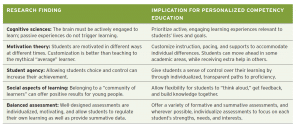5 Key Takeaways from The Past and the Promise: Today’s Competency Education Movement
CompetencyWorks Blog
Originally posted on October 20, 2014 at Jobs for the Future.
Students at the Center, a Jobs for the Future initiative that synthesizes and adapts for practice current research on key components of student-centered approaches to learning that lead to deeper learning outcomes, has just launched a new research series on competency education. Competency education is both a core tenet in our student-centered framework and an area of increasing interest to practitioners and policymakers.
Over the coming months, we will continue to release this series of research syntheses and updates from the field that help build the foundational data, theory, and information needed to support effective implementation and policy for competency education. (Sign up to be sure to receive new research.) We encourage you to read and share this publication with others in the field. Here are five key takeaways from the recent report:
1. Competency education is one important part of a broader vision of education reform that places students at the center of their education experience.
Students at the Center has collected and published evidence and arguments concluding that students are more engaged, more motivated, and achieve better learning outcomes under four key conditions:
- Education is personalized to their needs
- They can advance upon mastery of clear learning targets
- They have a range of learning opportunities in and out of school
- They have voice, choice, and agency in their learning experiences.
The potential impacts of competency education are greatly enhanced when combined with the other three reform strategies.
2. A personalized approach to competency education has the potential to help narrow achievement gaps and better prepare all young people for life after graduation, based on research and theory from the learning sciences.
This publication shines light specifically on the opportunities and challenges involved in combining tenets #1 and #2 above—personalization and competency education. The table below summarizes some of those findings.

3. 42 states in the past decade have granted public schools the flexibility to incorporate and explore competency-based policies, and a few states have moved beyond experimentation. Proponents are implementing a range of programs, from competency-based options within a school to districtwide efforts. For example:
- Oregon allows students to earn proficiency-based credits.
- New Hampshire has launched a statewide competency-based system that requires high schools to award credit based on mastery of material rather than seat time and passing grades.
- Maine will require districts to offer a diploma based on demonstration of proficiency by 2018.
Various states are also making real headway in designing and piloting performance-based assessments that provide valid and reliable information about students’ competencies outside of just reading and math, such as the ability to monitor one’s own learning, persist at challenging tasks, solve complex problems, set realistic goals, and communicate effectively in many kinds of settings.
4. Related past efforts, such as mastery learning, were effective but faced political, implementation, and public will challenges. Although competency education must confront many of the same issues, several important factors distinguish today’s efforts, such as:
- Recent advances in technology present options to both expand instructional possibilities and ease administrative difficulties.
- We know much more about assessment and how to measure factors that maximize students’ likelihood of making a successful transition to college and performing well in college courses.
5. Renewed interest in competency education relates to a variety of factors, including:
- The expanding global economy, which requires we challenge hundred-year-old structures to improve outcomes for all students to keep our nation competitive
- The uniting of the standards movement and personalization—approaches to education reform that were previously at odds
- Advances in technology that enable the level of learning customization, varied and engaging experiences and lessons, and ability to assess and track the numbers of students necessary to realize personalized competency education at scale
Sign up now to receive our forthcoming paper, Equity in Competency Education: Realizing the Potential, Overcoming the Obstacles, a closer look at implications for equity considerations in competency education.
Read the first paper from the Competency Education Research Series, The Past and the Promise: Today’s Competency Education Movement.
Rebecca E. Wolfe, PhD is a Program Director at Jobs for the Future and Director of the Students at the Center project.